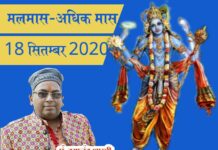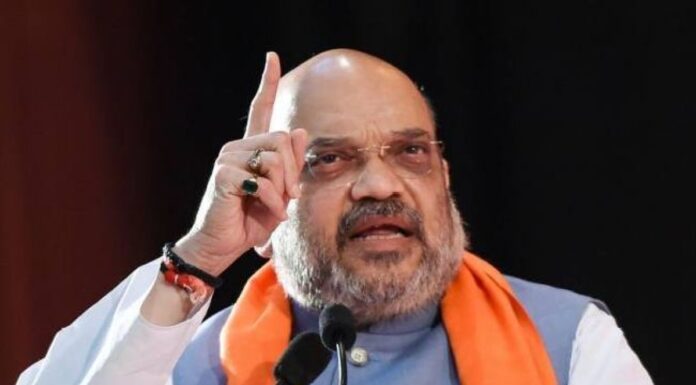Pitru Paksha (पितृ पक्ष) ~ Shraaddh–by Dr. Anjna Agarwal—
Pitru Paksha also known as Mahalaya Paksha or Shraaddh Paksha or Kanagat, is a period of fifteen days dedicated to dead ancestors and forefathers. During Pitru Paksha, Hindus pay homage to their ancestors, especially through food offerings. This is an occasion to perform rites for the departed ancestors to keep their souls indebted for years.
Pitru Paksha Shraaddh begins on Ashwin Krishna Pratipada or first day of Ashwin month and goes up to the following New Moon (Amavasya) day as per North Indian calendar. Pitru Paksha is performed for the departed immediate relatives usually up to three preceding generations.
Pitru Paksha is the occasion to repay debt to our departed ancestors by satisfying their souls by performing rites. For this purpose “Shraaddh” is performed with a belief that the dead ones would alive amongst us. Yama the Lord of death allows the souls to come down to the earth and receive offers from their descendants. This practice is made to the dead “Pitrus”. The last day of this period, the new moon day also called Sarvapitru Amavasya, is considered as the most important day in the year for performing obsequies and rites.
Legends related to Pitru Paksha—
According to Hindu mythology, the souls of three preceding generations of one’s ancestor reside in Pitru–loka, governed by Yama, who takes the soul of a dying man from earth to Pitru–loka. When a person of the next generation dies, the first generation shifts to heaven and unites with God, so Shraaddh offerings are not given. Thus, only the three generations in Pitru–loka are given Shraaddh rites, in which Yama plays a significant role.
When the legendary donor Karna died in the epic Mahabharata war, his soul transcended to heaven, where he was offered gold and jewels as food. Karna had done limitless charity of wealth, but had neglected to do Anna-Dana. Thus he found himself in the midst of wealth and plenty, but with no food to appease him. However, Karna needed real food to eat and asked lord Yama the reason for serving gold as food. Yama told Karna that he had donated gold all his life, but had never donated food to his ancestors in Shraaddh. Karna said that since he was unaware of his ancestors, he never donated anything in their memory. To make amends, Karna was permitted to return to earth for a fifteen day period, so that he could perform Shraaddh and donate food and water in their memory. This period is now known as Pitru Paksha.
The fifteen days of Mahalaya Paksha consists of .5 Tithi. They are Pratipat, Dvitiya, Tritiya, Chaturthi, Panchami, Shashti, Ashtami, Navami, Dasami, Ekadasi, Dvadasi, Trayodasi, Chaturdashi, Newmoon day (Sarvapitru Amavasya). According to Hindu mythology, every individual’s who wants to perform this Pitru Tharpanam, they should do it on the same day of their ancestor died which will fall within any one of these fifteen days.
Importance of Pitru Paksha—
The elder son or grandsons of the family performs Shraaddh in honor of the dead and offers respectful homage, during this period. It is believed that only after performance of Shraaddh ritual, the soul of the deceased relative attains Moksha. In this context, the scripture Garuda Purana says, “there is no salvation for a man without a son”. The scriptures preach that a householder should propitiate ancestors, along with the gods, ghosts and guests. The scripture Markandeya Purana says that if the ancestors are content with the Shraaddh, they will bestow health, wealth, knowledge and longevity, and ultimately heaven and salvation upon the performer.
The performance of Sarvapitri Amavasya rites can also compensate a forgotten or neglected annual Shraaddh ceremony, which should ideally coincide with the death anniversary of the deceased. The ceremony is central to the concept of lineages. Shraddha involves oblations to three preceding generations—by reciting their names—as well as to the mythical lineage ancestor (Gotra). A person thus gets to know the names of six generations (three preceding generation, his own and two succeeding generations—his sons and grandsons) in his life, reaffirming lineage ties.
Even those who died without progeny received these oblations given on this Pitru Paksha Amavasya day. All those who had failed to do deeds of charity and Anna-Dana and were thus denied these comforts in the Pitru Loka, benefited by these ceremonies. Those deceased whose date of death is not known and whose annual Sraaddha cannot be done, they also get these oblations of Pitru Paksha. Souls whose life was cut off by violent, accidental or unnatural death and to whom, therefore, offerings cannot reach in the ordinary course, to them, too, the Pitru Paksha offerings reach directly.
Things not to do—
During the period of Pitru Paksha, traditionally people do not buy or wear new clothes, and don’t get a hair-cut. The day they perform the ritual, male members of the family do not even shave. Women do not wash their hair on that particular day. Auspicious works like marriage, settling marriage, any kind of birth ceremony etc. are prohibited during this period.








pitra paksha sandesh very helpful
What about people who donot have sons? Do vedas indirectly favour sons and not daughtersz? Is it the reason for female foeticides in India? What about those who are born elsewhere in other dharmas? Do their souls permanently reside in hell?By asking these questions, donot brand me as nonbeliever. I do follow all these things meticulously. KIndly clarify.
Very Good article. Right guidance for people who would like to perform pitru puja.